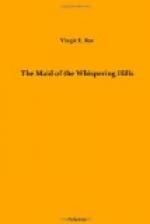“Only a matter of time,—a little time,” thought Wilson, at the prow, but never a word was uttered in the canoe.
Exerting every atom of strength, calling on all the will-power aboard, they shot forward into the night and the current.
The noise behind increased, as the tones of a bell blown by the wind increase when the wind sets in one’s direction.
“Not now!” Maren was saying to herself. “Not now,—when we are so far toward the winning! Not now,—oh, Friend of my heart! why was that price demanded? Holy Mary rest him, that young Marc Dupre—and send deliverance for this—”
Ahead the river swept around a turn. Keeping close to the shore they caught shallow water and cut round into a wider opening.
The cries behind veered and deadened, and suddenly Wilson in the prow raised his blade.
Maren leaned behind him and looked into the shadows.
On every side dark shapes covered the face of the stream like water-bugs, from every side there came the “whoo-sh-st-whoo-sh” of dipping paddles, the little plank and rattle of their shafts against gunwales.
They had glided into the midst of a flotilla of canoes travelling at night and in silence.
The maid from Grand Portage threw up her head.
“In among them,” she whispered, “quick! Deep as we can!”
“But, Ma’amselle,” whispered back Wilson, “they may be Indians.”
“What matters? A chance is a chance, and who would not risk its turning?”
Unconsciously she was quoting that kinsman whose dauntless courage and love of venture had found its last thrill in covering her retreat in the gorge.
“In among them! Deep!”
Softly, as one of their number, the fugitive craft crept out to midstream and forward, usurping boldly place and speed.
Leaning low at each stroke the little company strained eye and ear for sight and sound, but, look as they might, they saw no eagle feathers against the stars, heard no word or whisper.
Barely had they reached their uncertain sanctuary when the light of torches shot southward across the bend and next moment circled, a far-reaching arm, to spread out and illumine the river broadcast as the Nakonkirhirinons swept into view, their savage faces peering under the raised flambeaux, their eyes like fiery points—searching their prey.
It fell on all the river, that light, on the running waters disturbed by myriad blades of white ash, on the banked background of the trees, on the drooping foliage at the stream’s edge,—frail triflers of the wilderness, stooping from the sweet winds of Heaven to the water’s wanton kiss,—and on a swarm of canoes, each manned by full complement of men, most of whose faces were eagle-featured and dark, blackeyed and high-cheekboned, though here and there were the fair hair and white skin of white men.
Odd, indeed, was the effect of this tableau on the Indians under the torches. They had come for one lone canoe,—to find a horde; for one man and one woman,—to fall upon a brigade.




